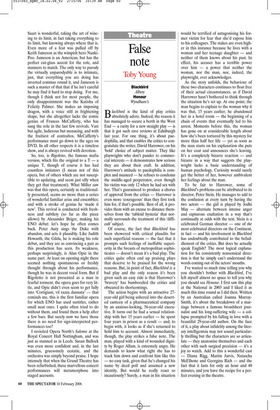False note
Toby Young
Blackbird Albery Honour Wyndham’s
Blackbird is the kind of play critics absolutely adore. Indeed, the reason it has managed to secure a berth in the West End — a rarity for a new straight play — is that it got such rave reviews at Edinburgh last year. For one thing, it’s about paedophilia, and that enables the critics to congratulate the writer, David Harrower, on his ‘bold’ choice of subject matter. They like playwrights who don’t pander to commercial interests — it demonstrates how serious they are about their craft. In addition, Harrower’s attitude to paedophilia is complex and nuanced — he refuses to condemn the middle-aged perpetrator, even though his victim was only 12 when he had sex with her. That’s guaranteed to produce a chorus of approval from the critics — Harrower is even more ‘courageous’ than they first took him for, if that’s possible. Best of all, it provides them with an excuse to distance themselves from the ‘tabloid hysteria’ that normally surrounds the treatment of this ‘difficult’ subject.
Of course, the fact that Blackbird has been showered with critical plaudits for such superficial reasons — the fact that it prompts such feelings of ineffable superiority in the breasts of metropolitan sophisticates — doesn’t mean it’s a bad play. The critics quite often end up praising plays that deserve to be praised for the wrong reasons. But, in point of fact, Blackbird is a bad play and the only reason it’s been given such an easy ride is that Harrower’s ‘bravery’ has bamboozled the critics and obscured its shortcomings.
The action begins with an attractive 27year-old girl being ushered into the deserted canteen of a pharmaceutical company by an anxious-looking, 56-year-old executive. It turns out he had a sexual relationship with her 15 years earlier — he spent four years in prison as a result — and, to begin with, it looks as if she’s returned to hold him to account. Almost immediately, though, the play strikes a false note. The man, played with a kind of wounded dignity by Roger Allam, is extremely angry. He demands to know what right she has to track him down and confront him like this — no easy task, given that he’s changed his name by deed poll and assumed a new identity. But would he really react so incautiously? Surely, a man in his situation would be terrified of antagonising his former victim for fear that she’d expose him to his colleagues. The stakes are even higher in this instance because he lives with a woman and her teenage daughter — and neither of them knows about his past. In effect, his accuser has a terrible power over him — a power that neither the woman, nor the man, nor, indeed, the playwright, ever acknowledges.
As the story unfolds, the behaviour of these two characters continues to float free of their actual circumstances, as if David Harrower hasn’t bothered to think through the situation he’s set up. At one point, the man begins to explain to the woman why it was that, 15 years earlier, he abandoned her in a hotel room — the beginning of a chain of events that eventually led to his arrest. Moments before this, the woman has gone on at considerable length about how she’s been tortured by this mystery for more than half her life — yet as soon as the man starts on his explanation she puts on her coat and announces she’s leaving. It’s a completely bizarre reaction — and bizarre in a way that suggests the playwright lacks a basic understanding of human psychology. Curiosity would surely get the better of her, however ambivalent her feelings about the man.
To be fair to Harrower, some of Blackbird’s problems can be attributed to its director, Peter Stein. He manages to add to the confusion at every turn by having the two actors — the girl is played by Jodhi May — alternate between intense anger and rapturous exultation in a way that’s continually at odds with the text. Stein is a celebrated German director — one of the most celebrated directors on the Continent, in fact — and his involvement in Blackbird has undoubtedly contributed to the befuddlement of the critics. But does he actually speak English? The most logical explanation for his consistently nonsensical direction is that he simply can’t understand the words coming out of the actors’ mouths.
I’ve wasted so much time telling you why you shouldn’t bother with Blackbird, I’ve left myself almost no space to tell you why you should see Honour. I first saw this play at the National in 2003 and I liked it as much this time round as I did then. Written by an Australian called Joanna MurraySmith, it’s about the breakdown of a marriage between a famous broadsheet journalist and his long-suffering wife — a collapse prompted by his falling in love with a beautiful 29-year-old author. On the face of it, a play about infidelity among the literary intelligentsia may not sound particularly thrilling but the characters are so articulate — they anatomise themselves and each other with such surgical precision — it’s a joy to watch. Add to this a wonderful cast — Diana Rigg, Martin Jarvis, Natascha McElhone and Georgina Rich — and the fact that it lasts for only an hour and 40 minutes, and you have the recipe for a perfect evening in the theatre.


















































































 Previous page
Previous page